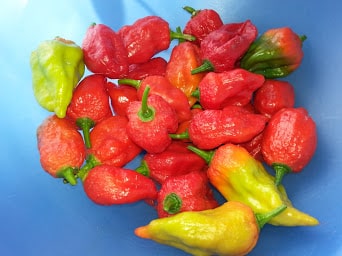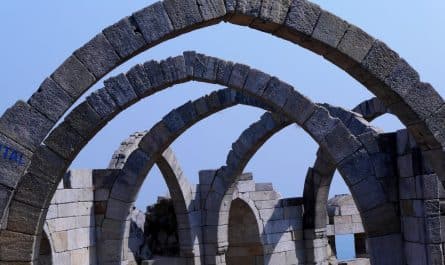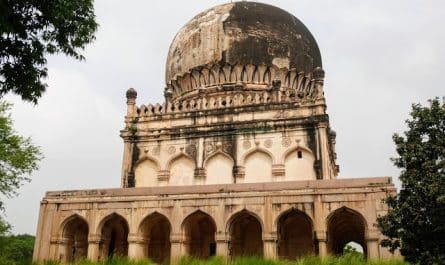I am shocked out of my sleep at 4.30 am by someone banging at the door and before I can answer, our pleasant host bellows “Jai Shree Krishna. It is time for the morning aarti” …Why on earth is the man shouting? Maybe I should just ignore him and go back to sleep? No, I’d promised myself I would wake up for the morning aarti…Come on now, mind over ice-cold matter…OK, here goes…
Have you ever walked barefoot down ice-cold cobbled streets at 4.45 am? Try it sometime.
The Yamuna aarti at Vishram Ghat in Mathura is one of life’s more beautiful experiences. The air is crisp and very cold. And big burly men think nothing of throwing liquid ice at your feet as they purify the Ghat for the daily aarti. And the aarti itself is a gigantic seven tier bronze structure with scores of brightly burning wicks. As it swings through the air amid raw, heartfelt invocations, the brightly burning wicks seem to bring with them the first light of dawn.
Vishram Ghat is one of the several ghats in Mathura. Each has its own myth and raison d’ etre. This particular one has the distinction of being the place where Lord Krishna is believed to have rested after killing his evil and tyrannical uncle, King Kansa.
While myths and legends surrounding sacred geographies define the very fabric of India, there is something in Braj Bhoomi — the sacred land of Lord Krishna — that has always struck me as different…odd… even unnerving. For instance, nobody here would ever say, “Lord Krishna is believed to have rested here after he killed Kansa “. What you will have instead is different people pointing to almost exactly the same spot on Vishram Ghat and saying, “This is where Krishna rested after he finished off that wicked Kansa”.
And it is the same for all the other “myths” that abound in Braj Bhoomi. “This is the pole to which Krishna was tied after Yashoda caught him stealing butter”. “That is Govardhan, the mountain Krishna lifted on his little finger to protect the residents of Braj from a devastating storm”. “This is the sacred grove where Krishna and Radha spent love-drenched afternoons”… the tales and anecdotes are endless. Every square foot of Braj Bhoomi lends itself to some fantastic tale. But what amazes me is that for the people here, this is not mythology, this is history. Every time I visit Mathura, I come away believing that if I met a really old person, he would probably say he saw Krishna sneaking off to meet Radha!!!
Everybody we meet here has his own favourite anecdote about Krishna. It is almost like people from a small town boasting about a particularly precocious child from within their fold who has suddenly made it big. Everyone vies for a rub-off of that fame by claiming close association with the child prodigy.
Or maybe I’m just letting my dirty city cynicism affect my judgement. The level of involvement with Krishna is not to gain recognition or fame, it is purer, simpler, deeper than that. It is more like believing in something so absolutely that it becomes the only Reality, the only Truth.
The area around Mathura is liberally dotted with sacred space. This was Krishna’s playground. It is the land where he performed his cosmic leela or play. After he was born in the prison cell in Mathura, his father Vasudev aided by several celestial forces stole him out of Mathura, across the raging river Yamuna and into the house of Nand in Gokul.
It is in Gokul that Krishna spent his early childhood and revealed the first signs of his divinity. Tales of Krishna’s childhood never fail to surprise me. We have a god who was incredibly, incorrigibly naughty!! He stole butter from all the neighbours, hid the clothes of women bathing in the Yamuna and ate dirt and mud off the streets!!
What are these stories saying? That childhood is innocent and pure and that all children have a touch of the divine? That children come to earth ‘trailing clouds of glory’…? Maybe. I’ve never quite figured out the purpose of these tales, but I love them. I love the thought of worshipping a God whose actions evoked a response of not just noble piety, but amusement, exasperation, wonder, anger, love, laughter… the whole gamut of human emotions.
One of the tales of Krishna’s childhood is that he ate dirt off the banks of the Yamuna and when Yashoda tried to force it out, he opened his mouth and revealed within him the entire cosmos. Even today, when you visit Brahman Ghat, it is customary to eat a little dirt almost as a form of prasad or sacred offering.
Near Gokul is Raman Reti, where the child Krishna is believed to have spent his days playing in the sand. The custom here is to roll around in the sand in imitation of the lord. First-time visitors are often amazed to see old men, married women and children rolling around in the sand. Locals here will tell you that a person who has not rolled in the sand at Raman Reti, has not yet lived his life.
As Krishna grew older, the constant threat on his life from the wicked envoys of Kansa forced Nand to leave Gokul and move Krishna to a more secure home high up on a hill in what is now known as Nandgaon.
From here, the adolescent Krishna, the cowherd, would wander into the Vrindavan forests to play with his friends, look after the cows and dally with Radha, his lady love.
From adoring Krishna as the precocious child, we now move to loving Krishna as the beloved. The forests of Vrindavan suggest a place of deep eroticism and an archetypal connection to nature. By moving in this space, we are moving in the transcendental world of Krishna’s leela, which is anchored in the physical landscape of Braj. While most pilgrimages are undertaken for spiritual or material merit, travelling to Vrindavan and Radha’s birthplace Barsana, are done for love alone.
Each tree in the area speaks of Radha-Krishna’s love. Each pool of water has witnessed their dalliance… And while we stand mesmerised by the magic of the land, two peacocks suddenly break into dance.
Saints and philosophers have written tomes on the love of Radha-Krishna. At its most simplistic, it is the ultimate relationship between a man and a woman. It tells of the intricate rules of courtship and love. Of the teasing, pining, laughter and tears that accompany Perfect Love. At a deeper level, Radha is the ultimate devotee. Her worships takes the form of an all-embodying love and in response to this love, Krishna reciprocates with all his heart. They are the Lover and the Beloved. And the beauty of the relationship is that their roles are quite easily interchangeable.
We head back to Mathura in time for the evening Yamuna aarti. This time, we slip into a boat and sail down the Yamuna so we are facing the aarti’s golden glow. Reverentially we slide diyas of light into the river and as hundred of these diyas twinkle on the water, our host points to a spot as shore and says “that is the place where Vasudev entered the Yamuna to cross over to Gokul …”




I’ve never wanted to visit Mathura more! The stories are beautiful and your affection for the place really shines through!
Have always loved Mathura. You should go there with us someday